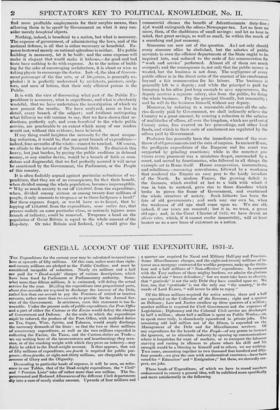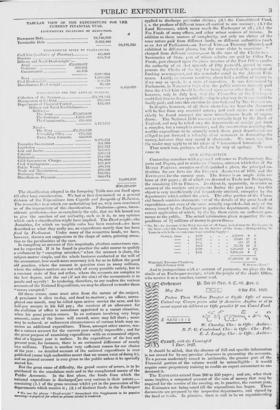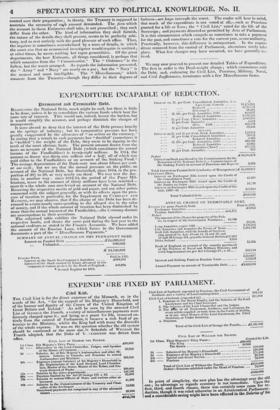GENERAL ACCOUNT OF THE EXPENDITURE, 1831-2.
'un Expenditure for the current year may be calculated in round num- -tiers at upwards of fifty millions. Of this sum, rather more than eight- and-twenty millions are pledged to the Public Creditor,, and must be considered incapable of reduction. Nearly six millions and a half are paid for "Dead-weight" charges of various descriptions, which have been fixed by Parliament or Parliamentary authority. Some- what more than fifteen millions, it is estimated, will defray the actual service for the year. Diaing the expenditure into proportional parts, about four-sevenths are rz:vired to discharge the interest of the Debt, tather less than one-seventh to pay the Pensions of retired or inactive servants, rather more than two-sevenths to provide for the Annual Ser- vice of the Government. In strictness, even this statement is too fa- vourable. Under the present scale of public expenditure, the Post-Office and a part of either the Customs or the Excise would defray the charges of Government and Defence. At the scale to which the expenditure might be reduced, the produce of the Post-Office, with modified duties on Tea, Sugar, Wine, Spirits, and Tobacco, would amply discharge the necessary demands of the State : so that the two or three millions of unnecessary expenditure, as well as the two millions expended in collecting the Excise, the Taxes, and the Custom-duties on Trade— we say nothing here of the inconvenience and beartburnings they occa- sion, or of the crushing weight with which they press on industry—may fairly be added to the Dead-weight account. It thus appears, that out of fifty millions of expenditure, one-fourth is required for public pur- poses—three-fourths, or eight-and-thirty millions, are chargeable to the account of Glory and the Oligarchy.
Descending to particular heads of expense, it will be seen, on refer- ence to our Tables, that of the Dead-weight expenditure, the " Civil" and "Pension Lists" take off rather more than one million. The Su- perannuated and Reduced Allowances of the different Civil departments 4lip into a sum of nearly similar amount. Upwards of four millions and a quarter are required for Naval and Military Half-pay and Pensions Some Miscellaneous charges, and the eight-and-twenty millions of in- terest on a mortgage contracted for warlike purposes, make up the thirty- four and a half millions of" Non-effective" expenditure. In common with the Tory authors of these mighty burdens, we admire the glorious victories of our "brave defenders ;" but we must take leave to observe, that "gratitude" is not the only Debt they have entailed upon us. "We fear, too, that "gratitude" is not the only one "the country," in the words of Lord ELDON, "will never be able to repay."
Of the fifteen millions required for active service, three and a half are expended on the Collection of the Revenue ; eight and a quarter on Defence ; Law and Justice swallow up three quarters of a million ; another million is required for Civil Government and the expenses of Legislation; Diplomacy and the Colonial Civil service are discharged by half a million ; about half a million is spent on Public Works,—or, to speak more truly, is shamelessly squandered in private jobs. The remaining odd half million out of the fifteen, is expended on the Management of the Debt and for Miscellaneous services. Of any expenditure for the benefit of the People—of any grants to instruct the ignorant, or to stimulate industry .by opening up communications where it languishes for want of markets, or to transport the labourer starving and rusting in idleness to places where his skill and his strength would be a blessing to himself and to others, we see nothing. Two sums, amounting together to two thousand four hundred and fifty- four pounds—we give the sum with mathematical exactness—have been voted for " Education" and "Emigration ;" but these, we shrewdly sus- pect, are jobs.
These beads of Expenditure, of which we have in round numbers endeavoured to convey a general idea, will be exhibited more specifically and more satisfactorily in the following
TABULAR VIEW OF THE EXPENDITURE FOR nig CURRENT FINANCIAL YEAR.
EXPENDITURE INCAPABLE OF REDUCTION.
Permanent Debt Terminable Debt
EXPENDITURE FIXED BY PARLIAMENT. 24,748,919
3,432,406 28,181,325
Civil List (exclusive of Pensions)
4:35,000
Pensions 648,782
Military and Naval Dead-weight—
Army £2,669,097
Ordnance 093,231
Commissariat 55, l3G
3,018,064
Navy 1,290,381
Civil Dead-weigh,
972,370
Miscellaneous Dead .weight 70,429
6,445,026
EXPENDITURE FOR THE ANNUAL SERVICE.
Collection of the Revenue Management of the Debt Departments of Financial Control
Military and Naval Establishments— Slilitarv—
The 'Army £3,563,040
The Ordnance 1 044,593 The Commissariat 315,5:33
£3,401,345 273,808 145,593
5,123,166
Naval—
The Navy
-€2,263,929
Victualliiig Office 674,322
Extra Navy Estimate 355,000
3,295,251
Executive Government 261,900
Legislation
247,772
Law and Justice
723,805
Colonial
220,357
Diplomatic
204,616
Civil Government Charges
195,000
Civil Contingencies
129,403
Public Works
490,756
Trade and :Manufacture •
273,580
Stationery Office
100,373
Miscellaneous Payment •
366,874
15,601,659
'.-.E50,228,010 The classification adopted in the foregoing Table was not fixed upon till after long consideration. We had at first determined on a general division of the Expenditure into Capable and Incapable of Reduction. The researches into which our undertaking led us, very soon convinced us of the impropriety of this classification. Profusion—gross, incon- siderate profusion—was so completely the rule, that we felt bound not to give the sanction of our authority, such as it is, to any opinion which such a classification might have implied. The Dead-weight—the Annuities, for which no tangible value has been received—we have described as what they really are, an expenditure merely that has been fixed by Parliament. Under many of the respective heads, we have, however, thrown out suggestions in the shape of notes, pointing atten- tion to the peculiarities of the case.
In compiling an account of this magnitude, absolute correctness can- not be expected. If it be found in practice the safer course to qualify a settlement by "excepting mistakes," when the account is short, the subject-matter simple, and the whole business conducted at the will of the accountant, how much more necessary is it for us to follow the good old practice, where the amount in question rises to many millions, where the subject-matters are not only of every possible variety, but in a constant state of flux and reflux, where the accounts are complex to the last degree, and the end (if not the aim) of the accountants is to puzzle and mystify ! In tendering, therefore, to our readers the various accounts of the National Expenditure, we may be allowed to tender them "errors excepted." Of these errors, some must arise from the nature of the subject. A pensioner is alive to-day, and dead to-morrow ; an officer, unem- ployed one month, may be called upon active service the next, and his half-pay merges in his full pay; the receiver of an allowance for the abolition of office is sometimes appointed to a vacant situation, when his quasi pension ceases. In an estimate involving very large amounts, some of the items will exceed, some may fall short ; some may be reduced, or unforeseen circumstances of various kinds may oc- casion an additional expenditure. These, amongst other causes, ren- der a correct account for the current year morally impossible; and for the great purpose of examining expenditure with an economical object, that of a bygone year is useless. In the expenditure of the last and present year, for instance, there is an estimated difference of nearly two millions. There is another very sufficient reason for our choice of the year : no detailed account of the national expenditure is ever published (some high authorities assert that no means exist of doing it), and no general account is ever given to the public unless it be specially moved for.
But the great cause of difficulty, the grand source of errors, is to be attnbuted to the scandalous state and to the complicated nature of the Public Accounts. In the first place, the funds from which the national expenditure is discharged:are very various in their nature ;— consisting (1.) of the gross revenue whilst yet in the possession of the departments which receive it ; (2.) of distinct funds in the Exchequer • We use the phrase "Dead-weight" throughout this Supplement in its popular meaning—an/molt for which no present service is rendered. applied to discharge particular claims ; (3.) the Consolidated Fund, i. e. the produce of different taxes all carried to one account ; (4.) the Land Revenues, which never reach the Exchequer at all; (5.) the Fee Funds of many offices, and other minor sources of income. In addition to these sources of complexity, not only are claims of the same nature paid from different funds, on different authorities (such as an Act of Parliament—an Annual Vote—a Treasury Minute), and exhibited in different places,- but the same claim is sometimea 4' •• charged from different sourees,—as in the case of the Clerks to t... Secretaries of State, part of whose salaries are paid by Office Feu Funds, part charged upon the gross revenue of the Post Office (under the authority of an Act upwards of fifty years old, passed to com- pensate the Clerks of the day for being deprived of the privilege of franking newspapers), and the remainder voted in the Annual Esti- mates. Lastly, an 'account involviag about half a million of money is, if we may so speak, ia a state of transition. It was determined by Parliament, in Noventi,er that the public services formerly paid from the Civil List should be claired upon some other fund. It was, however, only in July last, that the Chancellor of the Exchequer could find time to draw up a bill directing in what way the items should be finally paid ; and into this exertion he was badgered by Mr. 6 oui.auitx.
In despite, however, of all these obstacles, we hope the Accounts will be free from any essential eiTors; and such errors as exist will chiefly be found amongst the more miscellaneous heads of expen- diture. The National Debt account is virtually kept by the Bank of England, and may be relied on ; the departments of receipt put forth a complex, but a complete account ; amid time constitution requiring the warlike expenditure to be annually voted, those great departments are obliged to put forward a tolerably clear statement in denmading the money, however they may spend it afterwards. We trust, too, that the reader may apply to us the adage of " forewarned forearmed.-
Thus much was, perhaps, called for by way of apology. 1Ve next come to
OUR AUTHORITIES.
Contenting ourselves with a :...;!eral reference to Parliamentary Re- ports and Papers, and to works en Finance, amongst which that of Sir HENRY PARNELL occupies so (:;, tinguished a place, the principal au- thorities for our facts are the FINANCE ACCOUNTS of 1831, and the ESTIMATES for the current year. The former is an ample folio vo- lume of 200 pages ; 21 of which are devoted to Trade and Navigation, the remaining 178 to Finance. Its object is, apparently, to render an account of the receipts and payments during the past year ; but this object is very insufficiently and imperfectly attained, excepting by the departments which collect the aixes. The other portion of the Finan- cial branch contains statements :,ot of the details of the great heads of expenditure—not even of the sums actually expended—but only of the money issued by the Exchequer to particular departments, and for the correct application of which, by the by, there exists no sufficient gua- rantee to the public. The actual information given respecting the ex- penditure of 7+ millions of money is given thus- " No. 91—An Account or the Total Amount of all Sums issued from the Exchequer, in the Year ended 5th January 1.832, for the Service of the Army ; distinguishing the Years in which the several stuns were voted in Supply— SUPPLY, AMID • V;20 • . £12,000 0 0 1888021 . 1,544,05 4 101
• . 13,068 17 0 418 11 3 • 51,754 12 3 - . 1831 . 5,594,215 6 7 £7,910,292 18 Whitehall, Treasury Chambers,
290h 1:ebruar:Z,1032. T. SPRING Ric."
And in juxtaposition with a7 account of payments, we place the foe simile of an Exchequer receipt ; which the people of the Audit Office, who receive it as a voucher, cannot read.
It should be added, that the absence of full and specific information is not atoned for by any peculiar clearness in presenting the accounts. To a person moderately versed in arithmetic, the greater part of the Financial portion of the volume would be unintelligible : it would require some preparatory training to enable an expert accountant to un- derstand it.
The ESTIMATES extend from 200 to 250 pages ; and are, what their name implies, a computed account of the sum of money that may be required for the service of the ensuing, or, in practice, the current year, the Estimates not being voted till the expenditure has began. These documents are prepared by the respective departments, and signed by the head or heads. In practice, there is said to be no superintending control over their preparation ; in theory, the Treasury is supposed to ascertain the necessity of eafli amount demanded. The form which the account in these Estimates shall take, is not prescribed ; they each differ from the other. The kind of information they shall furnish, the nature of the details they shall present, seems to be perfectly arbi- trary, 'and to rest entirely with the good pleasure of each office. Thus, the inquirer is sometimes overwhelmed by a mass of details, in which the exact one that an economical investigator would require is omitted; at other times, he meets nothing but vague generalities. Of the great departments, the best Estimate, all things considered, is perhaps that which emanates from the " Commissariat." The " Ordnance" is the fullest, but the worst arranged. As regards the information presented, the " Army" and " Navy " are nearly on a par ;. but the " Navy" is the neatest and most intelligible. The " Miscellaneous," which emanate from the Treasury-though they differ in their degree's of
badness-are longo intervallo the worst. The reader will bear in mind, that much of the expenditure is not voted at all,-such as Pensions granted for a life or lives; the " Civil List," voted for the life of the Sovereign; and payments directed or permitted by Acts of Parliament. It is this circumstance which compels us sometimes to take a payment for the past, and sometimes a vote for the current year, as our authority. Practically, however, this difference is unimportant. In the expen- diture removed from the control of Parliament, alterations rarely take place. What few changes may have occurred, we have generally no- ticed.





















































 Previous page
Previous page